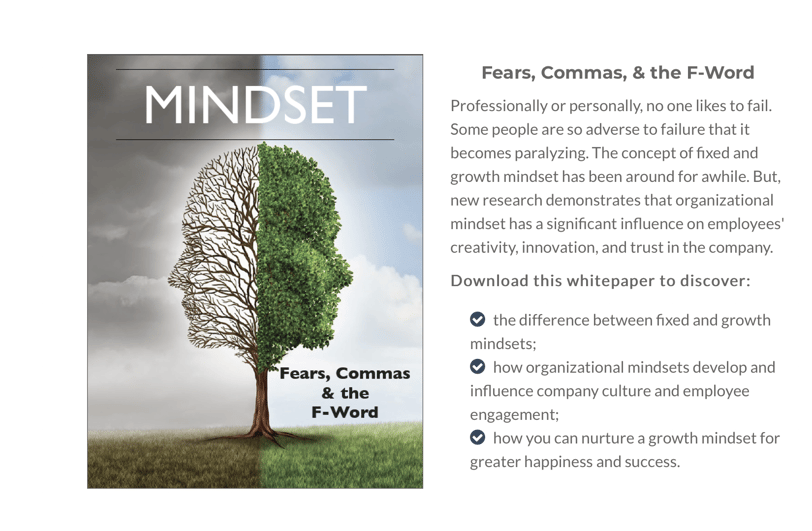Your mind is a powerful thing. The way you see yourself and your ability to learn doesn’t just impact your success, but also the goals you set and how you attack them. Organizations have a mindset, too, and it significantly influences company culture, employee engagement, and overall success.
Mindset Influences How and What We Learn
According to Stanford researcher Carol Dweck, the difference between what she calls a “fixed mindset” and a “growth mindset” is what determines what we learn and how well we learn it. Dweck maintains that a fixed mindset assumes our character, intelligence, and creativity are fixed traits that we have no control over. A growth mindset is the belief that even though we each have unique talents, aptitudes, and interests, our mental traits can change through effort and experience.
Dweck contrasts the two mindsets this way:
"In a fixed mindset, students believe their basic abilities, their intelligence, their talents, are just fixed traits. They have a certain amount and that's that, and then their goal becomes to look smart all the time and never look dumb. In a growth mindset students understand that their talents and abilities can be developed through effort, good teaching and persistence. They don't necessarily think everyone's the same or anyone can be Einstein, but they believe everyone can get smarter if they work at it."
Much of Dweck’s research explores how these mindsets are formed and how early on in life. In a study on hundreds of school-age children, she examined how different types of praise influences mindset as well as how each mindset impacts learning and academic achievement. Some students were praised for how hard they worked on various tasks while others were praised for their ability.
Two important findings stood out: (1) praise that focuses on effort nurtures a growth mindset while praise that focuses on ability nurtures a fixed mindset, and (2) students with a fixed mindset will reject learning experiences in order to avoid failure.
When students were given the choice to complete tasks of various difficulty levels, those who were praised for ability rejected any tasks that might result in failure or indicate deficiencies. To this group, failure meant they were not smart and the risk of that far outweighed the benefits of learning something new.
Conversely, those who were praised for effort weren’t intimidated by the risk of failing the difficult tasks. Rather, they embraced them as challenges. In fact, 90% of them wanted to tackle the most challenging tasks. To this group, failure was not a reflection of their intellect or ability, it was an indication that they just had to work harder to succeed.
The team expanded the research to find out if a fixed or growth mindset influences character traits such as honesty. They asked the students to write about their experience and disclose their scores on the tasks. Forty percent of the students in the ability-praised group inflated their scores to make them look more intelligent. Since a fixed mindset equates failure with deficiency, almost half of these students were so ashamed of their scores that they lied about them.
Dweck didn’t confine her research to school-age children. She examined brain waves of adults to determine how mindset affects the way people receive feedback. Those with a fixed mindset were much more interested in feedback about their ability than they were in feedback about how they could improve their ability. Those with a growth mindset were much more interested in learning how to improve regardless of their current ability. They saw ability as a starting point, not the ending point.
The collective body of this research confirms that our mindset is a powerful factor in our willingness to learn as well as our ability to learn new things.
Mindset Impacts Employee Engagement and Company Culture
Dweck extended her research even further to explore whether an organization can cultivate a fixed or a growth mindset, and if so, how it impacts employee engagement and company culture. Employees at seven Fortune 1000 companies were asked to rate statements about the company such as, “This company believes that people have a certain amount of talent, and they really can’t do much to change it.” High levels of agreement indicated the company had a fixed mindset; low levels suggested a growth mindset. The researchers then surveyed the employees to see if there was a correlation between mindset and job satisfaction, employee engagement, collaboration, and perception of culture as well as whether it impacted managers’ perceptions of employees.
Those employees that described their companies as having a growth mindset reported that they felt empowered to take risks and valued for the contributions they made. They also described their organizations as more collaborative and innovative, and they viewed themselves as respected members of the team.
Employees at fixed mindset companies reported cultures characterized by inequity, mistrust, dishonesty. Many said that only a handful of employees were valued and respected, and that the company largely didn’t care about the rest. They worried about being called out for failing, so they stayed in their comfort zones and avoided taking risks that could result in creativity and innovation. Employees who feel that innovation and hard work are only rewarded if they are successful are much more likely to put in the time, play it safe, and fly under the radar.
Leaders can cultivate a growth mindset in the organization by demonstrating that they value potential, capacity for learning and a passion for challenges. When employees feel that effort is as important than ability and they are encouraged to step out of their comfort zones without fear of being penalized for making mistakes along the way, engagement and collaboration increase significantly.
5 Simple Ways to Cultivate a Growth Mindset
Here is the good news: a growth mindset isn’t something you’re born with; it’s something you can develop. Here are some simple ways to do that.
1. Redefine the meaning of learning as brain training. Remember that the brain is like any other muscle in the body; the more you use it the stronger it gets.
2. Replace the words failure and mistakes with the words learning and experience. This shift in perspective turns the fear of failing into opportunities to improve. Without that fear, you’ll try more new things and you’ll learn from both mistakes and successes.
3. Embrace the word “yet.” Instead of saying, “I’m not good at that, “ train yourself to say, “I’m not good at that, yet.” That tiny word reinforces the belief that you have the power to improve.
4. Remember that the brain is not fixed and neither is your ability to learn. Each time you reach a goal, acknowledge the neuroplasticity at work in your brain. Then set a new goal knowing that you’re never done sculpting a better brain.
5. Cultivate grit. Think of grit as setting a goal so big that you can’t possibly reach it and then growing into the person who does. Embrace the challenge with the confidence that you have far more control over your brain than anything or anyone else.
If you enjoyed this post, share it with someone in your corner of the world.
Learn more about how to apply neuroscience to improve company culture,
Download my free whitepaper to learn more about mindset and the significant influence it has on personal and organizational success.
Check out Happier Hour with Einstein and the full-color companion Gratitude Journal










